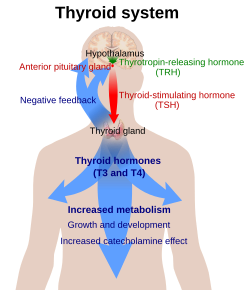Thyroid-stimulating hormone
[1] It is a glycoprotein hormone produced by thyrotrope cells in the anterior pituitary gland, which regulates the endocrine function of the thyroid.[2][3] TSH (with a half-life of about an hour) stimulates the thyroid gland to secrete the hormone thyroxine (T4), which has only a slight effect on metabolism.[1] TSH is secreted throughout life but particularly reaches high levels during the periods of rapid growth and development, as well as in response to stress.[citation needed] Reference ranges for TSH may vary slightly, depending on the method of analysis, and do not necessarily equate to cut-offs for diagnosing thyroid dysfunction.In pregnancy, TSH measurements do not seem to be a good marker for the well-known association of maternal thyroid hormone availability with offspring neurocognitive development.[20] Synthetic recombinant human TSH alpha (rhTSHα or simply rhTSH) or thyrotropin alfa (INN) is manufactured by Genzyme Corp under the trade name Thyrogen.[33] In this review it was found that the recombinant human thyrotropin-aided radioactive iodine appeared to lead to a greater reduction in thyroid volume at the increased risk of hypothyroidism.[34] The first standardised purification protocol for this thyrotropic hormone was described by Charles George Lambie and Victor Trikojus, working at the University of Sydney in 1937.
Thyroid-stimulating hormone, alphaRefSeqUniProtChr. 6Thyroid-stimulating hormone, betaChr. 1pituitary hormonethyroidthyroxinetriiodothyronineglycoproteinthyrotropeanterior pituitary glandthyroid hormonesHypothalamic–pituitary–thyroid axishypothalamusthyrotropin-releasing hormonepituitary glandSomatostatinnegative feedbackpulsatile mannerα (alpha) subunitchorionic gonadotropin alphahuman chorionic gonadotropinluteinizing hormonefollicle-stimulating hormoneTSH receptorthyroid follicular cellssodium-iodide symporterGraves' diseasehyperthyroidismtrophoblastic tumorsThyroid-stimulating hormone measurementThyroid function testsReference rangesAssociation for Clinical BiochemistryNational Academy of Clinical Biochemistryodds ratiohypothyroidismtumor of the pituitaryadenomathyroid hormone resistanceSecondary hypothyroidismCongenital hypothyroidismHashimoto's thyroiditistherapeutic target rangeHeterophilehuman anti-mouse antibodiesIsomerslevothyroxineSimpson's paradoxATC codeH01AB01Legal status℞-onlyCAS NumberCompTox DashboardECHA InfoCardrecombinantGenzyme Corpthyroid cancerCharles George LambieVictor TrikojusUniversity of SydneyBibcodeFood and Drug AdministrationMedlinePlus EncyclopediaMedical Subject HeadingsHormonesEndocrineglandsHypothalamic–pituitaryDopamineSomatostatin (GHIH)Posterior pituitaryOxytocinVasopressinAnterior pituitaryProlactinEndorphinsLipotropinAdrenal axisAldosteroneCortisolCortisoneDHEA-SAndrostenedioneAdrenalineNorepinephrineCalcitoninThyroid axisParathyroidGonadal axisTestisTestosteroneInhibinEstradiolProgesteroneActivinRelaxinPlacentaEstrogenPancreasGlucagonInsulinAmylinPancreatic polypeptidePineal glandMelatoninN,N-Dimethyltryptamine5-Methoxy-N,N-dimethyltryptamineThymusThymosinsThymosin α1Beta thymosinsThymopoietinThymulinDigestive systemStomachGastrinGhrelinDuodenumSecretinMotilinEnteroglucagonPeptide YYInsulin-like growth factor